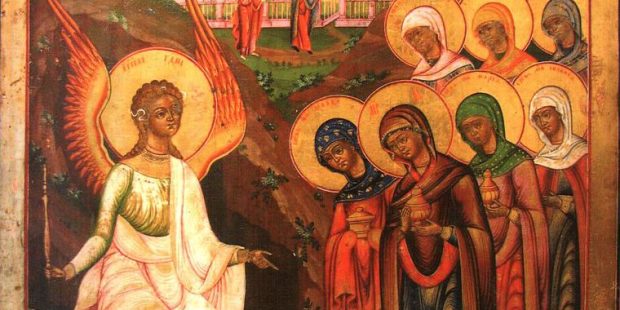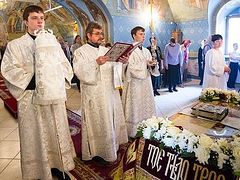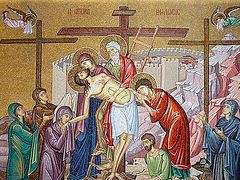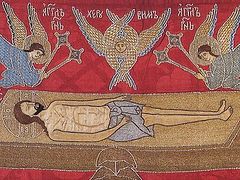 aleteiaen.files.wordpress.com
aleteiaen.files.wordpress.com
Matins
Mt. 27:62-66
Now the next day, that followed the day of the preparation, the chief priests and Pharisees came together unto Pilate, Saying, Sir, we remember that that deceiver said, while he was yet alive, After three days I will rise again. Command therefore that the sepulchre be made sure until the third day, lest his disciples come by night, and steal him away, and say unto the people, He is risen from the dead: so the last error shall be worse than the first. Pilate said unto them, Ye have a watch: go your way, make it as sure as ye can. So they went, and made the sepulchre sure, sealing the stone, and setting a watch.
The Jews got what they wanted. They have seen Christ dead and they know He has been laid in the grave, and now they can go to their feast. But our feast is different. We don’t celebrate as the Jews—not in the leaven of malice and wickedness, but in unleavened purity and truth. For Christ—our Pascha—was devoured for us. The Jews went to Pilate and told him that Christ, while He was still alive, said that He would resurrect on the third day. It’s not that the Jews would allow for such a possibility, but they feared that the disciples would come and steal their Teacher sand say that He rose from the dead. And they entreated Pilate to set a guard and take some measures. And Pilate said to them: Ye have a watch: go your way, make it as sure as ye can (v. 65). He as if speaks not knowing what he is saying: “Try to keep Christ in the grave, if you can.” And they did undertake all measures.
A huge stone—very great—had been set up against the tomb, and the tomb was sealed, and a guard was set at the tomb. But they did not consider one thing—that there is no tomb in the world that could restrain the risen Christ, and no Sanhedrin, and no sages in the whole world, and no authorities with all the sophistication of their lies, with all the gold in the world, with which they could, as it seemed to them, buy everything, even witnesses of the Resurrection, with all the threats of persecution. There is no power that could withhold the risen Christ in the grave.
Because by His death, Christ took away the power of death from he who had the power of death, that is, the devil. And we can now hear: “Today hell groans and cries aloud.” And the angel is already announcing the joy: Why seek ye the living among the dead? He is not here, but is risen. Christ descended into hell, shattering the gates of brass, and the joyful rumble of this victory is approaching us. A little bit more and this news, which will shake all of Heaven and earth, will come to us. And this joy will fill everything. A joy which neither life nor death, neither anyone nor anything can take from us, because eternal life, which hath shone forth from the tomb, is given to us by God forever.
Liturgy
Mt. 28:1-20
In the end of the sabbath, as it began to dawn toward the first day of the week, came Mary Magdalene and the other Mary to see the sepulchre. And, behold, there was a great earthquake: for the angel of the Lord descended from heaven, and came and rolled back the stone from the door, and sat upon it. His countenance was like lightning, and his raiment white as snow: And for fear of him the keepers did shake, and became as dead men. And the angel answered and said unto the women, Fear not ye: for I know that ye seek Jesus, which was crucified. He is not here: for he is risen, as he said. Come, see the place where the Lord lay. And go quickly, and tell his disciples that he is risen from the dead; and, behold, he goeth before you into Galilee; there shall ye see him: lo, I have told you. And they departed quickly from the sepulchre with fear and great joy; and did run to bring his disciples word. And as they went to tell his disciples, behold, Jesus met them, saying, All hail. And they came and held him by the feet, and worshipped him. Then said Jesus unto them, Be not afraid: go tell my brethren that they go into Galilee, and there shall they see me. Now when they were going, behold, some of the watch came into the city, and shewed unto the chief priests all the things that were done. And when they were assembled with the elders, and had taken counsel, they gave large money unto the soldiers, Saying, Say ye, His disciples came by night, and stole him away while we slept. And if this come to the governor's ears, we will persuade him, and secure you. So they took the money, and did as they were taught: and this saying is commonly reported among the Jews until this day. Then the eleven disciples went away into Galilee, into a mountain where Jesus had appointed them. And when they saw him, they worshipped him: but some doubted. And Jesus came and spake unto them, saying, All power is given unto me in heaven and in earth. Go ye therefore, and teach all nations, baptizing them in the name of the Father, and of the Son, and of the Holy Ghost: Teaching them to observe all things whatsoever I have commanded you: and, lo, I am with you always, even unto the end of the world. Amen.
Great and Holy Saturday is the day when the Lord rested from all His works, having created the world and man and introduced him as king to the universe. And it is the day when He completed the work of our salvation. This Saturday is blessed. In it is the hidden victory and silence before the mystery of God Who became man. “Let all mortal flesh keep silence, and stand with fear and trembling; and let it take no thought for any earthly thing. For the King of Kings and Lord of Lords draws near to be sacrificed and given as food to the faithful.” No one has ever spoken like Christ, and Christ has never spoken as He speaks now by His silence. All the words of the Gospel that we were to have read up until today are encompassed in His silence. And there are even more that are not written in these books, and there are even more we cannot now accommodate. All truth, all love, all the fullness of life.
If we hear this silence of God, we will be given to know of His victory, which has already been accomplished. It is given first to the most faithful—the Myrrh-bearing Women, who follow Christ to the Cross and stand by the Cross. They go to the tomb, overcoming fear. For love draws them to where the Lord is.
And this victory is revealed to those faithful who did not depart from the Lord in all of these holy days, not listening to the hymns of the Church with an external hearing alone. To those faithful who now learn that Christ descends into hell, filling it with His presence, destroying it completely, and to those who know that their every sin is what relates to hell. And they themselves relate to hell if they do not completely separate themselves from this sin by repentance. They are given to know now that the light of Christ touches even the depth of their hearts.
In the Resurrection of Christ, as in the hour of His death, the earth shook, marking the cosmic significance of the event. The messenger of God, shining with light, rolled away the stone that was covering the tomb—but not for the resurrected Lord to leave. The Lord did not need the road to be cleared for Him, just as He would not need the doors to be opened for His entrance to His disciples in the Zion upper room. The angel solemnly sits on the stone—so the radiance of the Heavenly glory, resting on him, illuminates the empty tomb, and the two Marys can see that the Lord’s Body is not in it.
The Gospel of Matthew is the only witness that mentions the guards who were responsible to the Jews for what happened. His disciples came by night, and stole him away while we slept. It was not from fatigue that the soldiers’ eyelids became heavy, but from fear that they became as dead men. One and the same light descending from Heaven causes joy in some and fear in others, and so it will be even unto the end of the age. The light shineth in darkness (Jn. 1:5) and causes a division. Those who receive this news with faith and enter into the joy of their Lord are transfigured into children of light. Those who prefer the darkness hate this Paschal light, for it exposes their evil deeds and their belonging to the prince of this world.
We see that the black vestments in church have been changed to white. What does it mean? It means that the Lord has overcome all darkness by His light. There is no longer any darkness for those who follow the Lord. Throughout all of Great Lent, the Church wore black vestments as a sign that the light was transformed into darkness—so great is our sin; and as a sign that the sun has faded, seeing what happened with the Creator of the world on the Cross. We participate in this mystery by Great Lent. And now the angel descends from Heaven, and his countenance was like lightning, and his raiment white as snow. This reflection is from that light that comes from our God, Who by His light descended into hell. This reflection is from that light which He revealed to His chosen disciples on the mount of the Transfiguration, when He spoke about His exodus, about the Cross, and about His burial, about that He has prepared this light before the face of all people.
And today is accomplished with us that which we constantly hear in our most important penitential psalm: Thou shalt wash me and I shall be made whiter than snow. The souls of those who went through Lent with repentance, of those who participated in what the Lord has accomplished, are whitened more than snow. They are whitened more than snow by the whiteness of the Lord. And the Lord says: “He that overcometh sin, he that overcometh death, he that overcometh the devil, the same shall be clothed in white raiment” and I will give him a white stone, and in the stone a new name written, which no man knoweth saving he that receiveth it—this whiteness on the Great and Holy Blessed Sabbath.
This is the mystery of this day. And we will wait for this whiteness, which symbolizes not only purity and holiness, but also the joy and triumph of the victory of Christ, to be revealed in a multi-colored Paschal jubilation, when the Pre-Eternal Word, Which was in the beginning, will speak face-to-face with the faithful in His Resurrection.
“Fear not!” the angel says. And we see, on the one hand, the soldiers, and those who command them, guarding the lifeless body of the Lord, and on the other hand, the Myrrh-bearing Women, seeking the crucified Jesus, Whose death they refuse to accept—He remains alive for them. Knowing why they have come to the tomb, the angel invites them to see the place where the Lord lay, so they would be sure that He is not here. The message of the Heavenly messenger, which will change the course of human history, is full of incomprehensible simplicity: “He is risen as He said.” Was there any time when the Almighty God did not keep His word? There’s no time to lose before the urgent task of saving mankind. And go quickly, and tell His disciples that He is risen from the dead; and, behold, He goeth before you into Galilee. The shocked Myrrh-bearing Women hasten to fulfill the angel’s command with fear and great joy, not yet understanding what had happened, but holding onto the hope that the angel of the Lord had given them with all their might. The mercy of the Lord always exceeds our expectations. The risen Christ meets them along the way to Jerusalem. In the first rays of the rising sun, they immediately recognize the Lord Who addresses them with the greeting very familiar to them: “Rejoice!” They draw near to Him as they did before. But knowing that only God can pass through death, they prostrated to Him and grasped His feet, as if trying to restrain Him.
That which was from the beginning, which we have heard, which we have seen with our eyes, which we have looked upon, and our hands have handled, of the Word of life—these words that begin the first Catholic Epistle of the apostle John the Theologian could have been written by Mary Magdalene and the other Mary. “Indeed, the risen Christ appeared to us. We have seen and testify and declare to you that He Who came from the Father appeared to us, having conquered death.” The Lord affirms them in their ministry, adding nothing to the angel’s good news, except calling His disciples brothers, as if emphasizing that their betrayal did not shake His love for them and restoring them to their apostolic dignity. Everyone who follows Christ, even with a timid and unstable faith, is elevated by His Resurrection to the dignity of the sons of God in the Only-Begotten Son, Who calls them His brothers before God the Father. He not only comes to meet us, He abides in us, and we abide in Him. We are given to know the signs of His presence in the incomparable joy that He communicates to us in the Holy Spirit, and He precedes us in our daily Galilee.
The risen Lord sends His disciples to Galilee, to the mountain, and meets them. They saw Him there and prostrated to Him. These words indicate in what should consist our faith —that we would see the Lord and worship Him, so we would all sing together at the Resurrection vigil, “Having Beheld the Resurrection of Christ.” And to worship the Lord means to confess Him as our Lord and God.
We remember from the Gospel how the man born blind who gained his sight answers the Savior’s question about whether he believes in Christ: Who is He, Lord, that I might believe on Him? Thou hast both seen Him, and it is He that talketh with thee, the Lord answers him. And he worshipped Him and said: Lord, I believe. This is where the Christian life begins. But some, it says further in today’s Gospel, doubted. But they doubted in order to have a better faith. Genuine faith is costly. And the apostles themselves, witnesses of the greatest miracles of Christ, cannot immediately accept the news of the Resurrection. The apostle Thomas, when ten others tell him they saw the Lord, answers them: “Except I shall see Him myself, I will not believe.” After the appearance of the risen Christ to him, he confesses: My Lord and my God. Thus is accomplished a wonderful transition from unbelief to faith.
All power is given unto me in Heaven and in earth, the Lord says to His disciples. There is nothing beyond the power of He Who died and arose. Every authority that exists on earth exists either by the blessing of God or by the permission of God. The Church passes through different historical periods, it lives under different authorities, but all power always belongs only to the Lord. Therefore, we should not be afraid of anything. All people are called to blessed communion with God, with the Holy Trinity. In the Sacrament of Baptism, which is accomplished by the power of God, not of man, we promise God to be obedient to all of His commandments and all the provisions of the Church, without exception. The foundation of the Church is laid by Christ’s Resurrection. Therefore, the gates of hell will not prevail against it.
Christ firmly promises that He will be with us, with His disciples, every day in the Holy Spirit until the end of the age, until His Second Coming. That means in all sorrows, in all trials, in death itself. In the closing words of the Gospel, read at the Liturgy on Holy Saturday, the word “all” is repeated many times: all power, to all peoples, all that I have commanded you, all days until the end of the age. Christ embraces everyone by His Cross, His descent into hell, and His Resurrection, loving us completely. And He expects that we respond to Him and His Paschal gift with our entire life and death.



